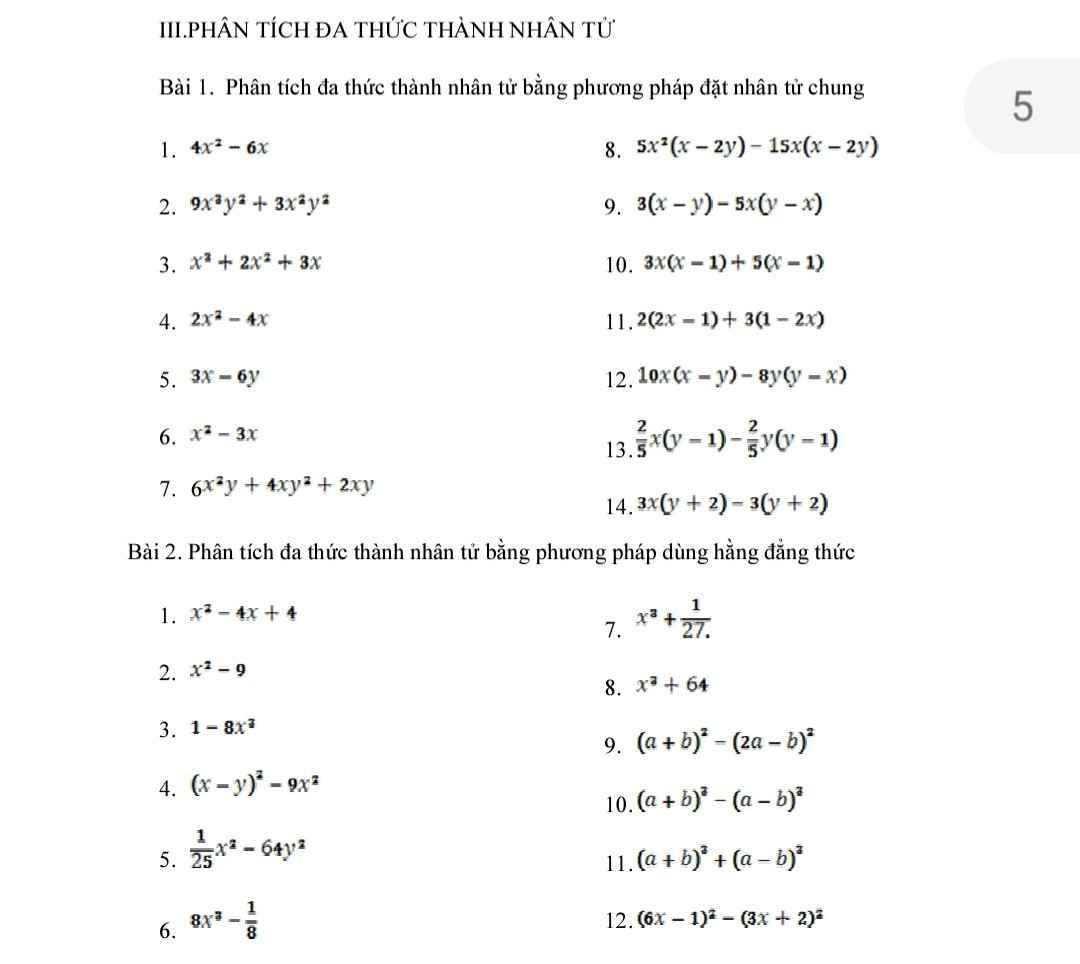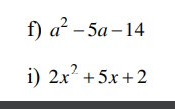1.Phân tích đa thức thành nhân tử

Những câu hỏi liên quan
1 a. phân tích đa thức -x3 + 3x2 - 3x + 1 thành nhân tử
b. phân tích đa thức 1 - 3x + 3x2 - x3 thành nhân tử
1a) \(=-\left(x^3-3x^2+3x-1\right)=-\left(x-1\right)^3\)
b) \(=-\left(x^3-3x^2+3x-1\right)=-\left(x-1\right)^3\)
Đúng 3
Bình luận (0)
\(a,=-\left(x-1\right)^3\left[=\left(1-x\right)^3\right]\\ b,=\left(1-x\right)^3\)
Đúng 2
Bình luận (1)
a. \(=-\left(x^3-3x^2+3x-1\right)=-\left(x-1\right)^3\)
b. \(=\left(1-x\right)^3\)
Đúng 1
Bình luận (0)
Phân tích đa thức thành nhân tử -8 - Phân tích đa thức thành nhân tử -8 x mũ 3 cộng 1 ta được
\(-8x^3+1=1^3-\left(2x\right)^3=\left(1-2x\right)\left(1+2x+4x^2\right)\)
Đúng 1
Bình luận (0)

bài 1:phân tích đa thức thành nhân tử bằng phương pháp đặt nhân tử chung
bài 2:phân tích đa thức thành nhân tử bằng phương pháp dùng hằng đẳng thức
mình cần gấp sos
Bài 2:
1) \(x^2-4x+4=\left(x-2\right)^2\)
2) \(x^2-9=x^2-3^2=\left(x-3\right)\left(x+3\right)\)
3) \(1-8x^3=\left(1-2x\right)\left(1+2x+4x^2\right)\)
4) \(\left(x-y\right)^2-9x^2=\left(x-y\right)^2-\left(3x\right)^2=\left(x-y-3x\right)\left(x-y+3x\right)=\left(-2x-y\right)\left(4x-y\right)\)
5) \(\dfrac{1}{25}x^2-64y^2=\left(\dfrac{1}{5}x-8y\right)\left(\dfrac{1}{5}x+8y\right)\)
6) \(8x^3-\dfrac{1}{8}=\left(2x-\dfrac{1}{2}\right)\left(4x^2+x+\dfrac{1}{4}\right)\)
Đúng 1
Bình luận (1)
Bài 2:
7) \(x^3+\dfrac{1}{27}=\left(x+\dfrac{1}{3}\right)\left(x^2+\dfrac{1}{3}x+\dfrac{1}{9}\right)\)
8) \(x^3+64=\left(x+4\right)\left(x^2+4x+16\right)\)
9) \(\left(a+b\right)^2-\left(2a-b\right)^2=\left(a+b+2a-b\right)\left(a+b-2a+b\right)=3a\left(-a+2b\right)\)
10) \(\left(a+b\right)^2-\left(a-b\right)^2=\left(a+b+a-b\right)\left(a+b-a+b\right)=2a\cdot2b=4ab\)
11) \(\left(a+b\right)^3+\left(a-b\right)^3=\left(a+b+a-b\right)\left[\left(a+b\right)^2+\left(a+b\right)\left(a-b\right)+\left(a-b\right)^2\right]\)
\(=2a\left(a^2+2ab+b^2+a^2-b^2+a^2-2ab+b^2\right)\)
\(=2a\left(3a^2+b^2\right)\)
12) \(\left(6x-1\right)^2-\left(3x+2\right)^2=\left(6x-1+3x+2\right)\left(6x-1-3x-2\right)=\left(9x+1\right)\left(3x-3\right)\)
Đúng 1
Bình luận (0)
1:
1: ,4x^2-6x=2x(2x-3)
2: 9x^3y^2+3x^2y^2=3x^2y^2(3x+1)
3: x^3+2x^2+3x=x(x^2+2x+3)
4: 2x^2-4x=2x(x-2)
5: 3x-6y=3(x-2y)
6: x^2-3x=x(x-3)
7: 6x^2y+4xy^2+2xy
=2xy(3x+2y+1)
8: 5x^2(x-2y)-15x(x-2y)
=(x-2y)(5x^2-15x)
=5x(x-3)(x-2y)
9: =3(x-y)+5y(x-y)
=(x-y)(5y+3)
10: =(x-1)(3x+5)
11: =2(2x-1)-3(2x-1)
=-(2x-1)
Đúng 1
Bình luận (0)
bài 1: Phân tích đa thức thành nhân tử : x^2-6x+8
bài 2: Phân tích đa thức thành nhân tử : x^8+x^7+1
Bài 1 :
\(x^2-6x+8=x^2-2x-4x+8=x\left(x-2\right)-4\left(x-2\right)=\left(x-4\right)\left(x-2\right)\)
Bài 2 :
\(x^8+x^7+1=x^8+x^7+x^6+x^5+x^4+x^3+x^2+x+1-x^6-x^5-x^4-x^3-x^2-x\)
\(=x^6\left(x^2+x+1\right)+x^3\left(x^2+x+1\right)+x^2+x+1-x^4\left(x^2+x+1\right)-x\left(x^2+x+1\right)\)
=\(\left(x^2+x+1\right)\left(x^6+x^3+1-x^4-x\right)\)
Tick đúng nha
Đúng 0
Bình luận (0)
Bài 1: Phân tích đa thức thành nhân tử a)4(2-x)^2+xy-2y b)3a^2x-3a^2y+abx-abyBài 2: Phân tích đa thức thành nhân tử a)x(x-y)^3-y(y-x)^2-y^2(x-y) b)2ax^3+6ax^2+6ax+18aBài 3: Phân tích đa thức thành nhân tử a)x^2y-xy^2-3x+3y b)3ax^2+3bx^2+bx+5a+5bBài 4: Tính giá trị biểu thức Aa(b+3)-b(3+b) tại a2003 và b1997Bài 5: Tìm x, biếta)8x(x-2017)-2x+40340 b)x^2(x-1)+16(1-x)0
Đọc tiếp
Bài 1: Phân tích đa thức thành nhân tử
a)4(2-x)\(^2\)+xy-2y b)3a\(^2\)x-3a\(^2\)y+abx-aby
Bài 2: Phân tích đa thức thành nhân tử
a)x(x-y)\(^3\)-y(y-x)\(^2\)-y\(^2\)(x-y) b)2ax\(^3\)+6ax\(^2\)+6ax+18a
Bài 3: Phân tích đa thức thành nhân tử
a)x\(^2\)y-xy\(^2\)-3x+3y b)3ax\(^2\)+3bx\(^2\)+bx+5a+5b
Bài 4: Tính giá trị biểu thức
A=a(b+3)-b(3+b) tại a=2003 và b=1997
Bài 5: Tìm x, biết
a)8x(x-2017)-2x+4034=0 b)x\(^2\)(x-1)+16(1-x)=0
\(1,\\ a,=4\left(x-2\right)^2+y\left(x-2\right)=\left(4x-8+y\right)\left(x-2\right)\\ b,=3a^2\left(x-y\right)+ab\left(x-y\right)=a\left(3a+b\right)\left(x-y\right)\\ 2,\\ a,=\left(x-y\right)\left[x\left(x-y\right)^2-y-y^2\right]\\ =\left(x-y\right)\left(x^3-2x^2y+xy^2-y-y^2\right)\\ b,=2ax^2\left(x+3\right)+6a\left(x+3\right)\\ =2a\left(x^2+3\right)\left(x+3\right)\\ 3,\\ a,=xy\left(x-y\right)-3\left(x-y\right)=\left(xy-3\right)\left(x-y\right)\\ b,Sửa:3ax^2+3bx^2+ax+bx+5a+5b\\ =3x^2\left(a+b\right)+x\left(a+b\right)+5\left(a+b\right)\\ =\left(3x^2+x+5\right)\left(a+b\right)\\ 4,\\ A=\left(b+3\right)\left(a-b\right)\\ A=\left(1997+3\right)\left(2003-1997\right)=2000\cdot6=12000\\ 5,\\ a,\Leftrightarrow\left(x-2017\right)\left(8x-2\right)=0\\ \Leftrightarrow\left[{}\begin{matrix}x=2017\\x=\dfrac{1}{4}\end{matrix}\right.\\ b,\Leftrightarrow\left(x-1\right)\left(x^2-16\right)=0\Leftrightarrow\left[{}\begin{matrix}x=1\\x=4\\x=-4\end{matrix}\right.\)
Đúng 2
Bình luận (0)
 phân tích đa thức sau thành nhân tử(tách 1 hạng tử thành nhiều hạng tử)
phân tích đa thức sau thành nhân tử(tách 1 hạng tử thành nhiều hạng tử)
 phân tích đa thức sau thành nhân tử(tách 1 hạng tử
phân tích đa thức sau thành nhân tử(tách 1 hạng tử
thành nhiều hạng tử
f, \(a^2-5a+14\) không phân tích được thành nhân tử.
i, \(2x^2+5x+2=2x^2+4x+x+2=2x\left(x+2\right)+\left(x+2\right)=\left(x+2\right)\left(2x+1\right)\)
Đúng 1
Bình luận (0)
 phân tích đa thức sau thành nhân tử(tách 1 hạng tử thành nhiều hangj tử(kè công thức dùm )
phân tích đa thức sau thành nhân tử(tách 1 hạng tử thành nhiều hangj tử(kè công thức dùm )
g) `2m^2+10m+8`
`=(2m^2+2m)+(8m+8)`
`=2m(m+1)+8(m+1)`
`=(m+1)(2m+8)`
f) `4p^2-36p+56`
`=(4p^2-8p)-(28p-56)`
`=4p(p-2)-14(p-2)`
`=(p-2)(4p-14)`
Đúng 1
Bình luận (0)
Bài 1 : Phân tích các đa thức sau thành nhân tử :1) 15x + 15y 2) 8x - 12y3) xy - x 4) 4x^2- 6xBài 2 : Phân tích các đa thức sau thành nhân tử :1) 2(x + y) - 5a(x + y) 2) a^2(x - 5) - 3(x - 5)3) 4x(a - b) + 6xy(a - b) 4) 3x(x - 1) + 5(x -1)Bài 3 : Tính giá trị của biểu thức :1) A 13.87 + 13.12 + 132) B (x - 3).2x + (x - 3).y tại x 13 và y 4Bài 4 : Tìm x :1) x(x - 5) - 2(x - 5) 0 2) 3x(x - 4) - x + 4 03) x(x - 7) -...
Đọc tiếp
Bài 1 : Phân tích các đa thức sau thành nhân tử :
1) 15x + 15y 2) 8x - 12y
3) xy - x 4) 4x^2- 6x
Bài 2 : Phân tích các đa thức sau thành nhân tử :
1) 2(x + y) - 5a(x + y) 2) a^2(x - 5) - 3(x - 5)
3) 4x(a - b) + 6xy(a - b) 4) 3x(x - 1) + 5(x -1)
Bài 3 : Tính giá trị của biểu thức :
1) A = 13.87 + 13.12 + 13
2) B = (x - 3).2x + (x - 3).y tại x = 13 và y = 4
Bài 4 : Tìm x :
1) x(x - 5) - 2(x - 5) = 0 2) 3x(x - 4) - x + 4 = 0
3) x(x - 7) - 2(7 - x) = 0 4) 2x(2x + 3) - 2x - 3 = 0
\(1,\\ 1,=15\left(x+y\right)\\ 2,=4\left(2x-3y\right)\\ 3,=x\left(y-1\right)\\ 4,=2x\left(2x-3\right)\\ 2,\\ 1,=\left(x+y\right)\left(2-5a\right)\\ 2,=\left(x-5\right)\left(a^2-3\right)\\ 3,=\left(a-b\right)\left(4x+6xy\right)=2x\left(2+3y\right)\left(a-b\right)\\ 4,=\left(x-1\right)\left(3x+5\right)\\ 3,\\ A=13\left(87+12+1\right)=13\cdot100=1300\\ B=\left(x-3\right)\left(2x+y\right)=\left(13-3\right)\left(26+4\right)=10\cdot30=300\\ 4,\\ 1,\Rightarrow\left(x-5\right)\left(x-2\right)=0\Rightarrow\left[{}\begin{matrix}x=2\\x=5\end{matrix}\right.\\ 2,\Rightarrow\left(x-7\right)\left(x+2\right)=0\Rightarrow\left[{}\begin{matrix}x=7\\x=-2\end{matrix}\right.\\ 3,\Rightarrow\left(3x-1\right)\left(x-4\right)=0\Rightarrow\left[{}\begin{matrix}x=\dfrac{1}{3}\\x=4\end{matrix}\right.\\ 4,\Rightarrow\left(2x+3\right)\left(2x-1\right)=0\\ \Rightarrow\left[{}\begin{matrix}x=-\dfrac{3}{2}\\x=\dfrac{1}{2}\end{matrix}\right.\)
Đúng 4
Bình luận (0)
Phân tích đa thức thành nhân tử:
32x4 + 1
\(64x^4+1\)
\(=64x^4+16x^2+1-16x^2\)
\(=\left(8x^2-4x+1\right)\left(8x^2+4x+1\right)\)
Đúng 1
Bình luận (0)
























